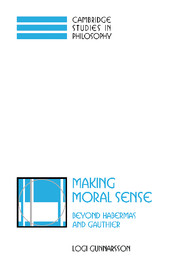Book contents
15 - Against formalism
Published online by Cambridge University Press: 22 September 2009
Summary
What does the rationality and irrationality of actions consist in? What settles the question of whether a person has a good reason to do something? It is the task of theories of practical reason to answer such questions. I take myself to have already shown (in chapter 10) that we should reject one such theory – namely, subjectivism. This means that we should also assume that we sometimes have external reasons to perform certain actions. In this part of the book, I shall take this as an established result. I have also argued (in 11.1–2) that the criteria for determining whether we have a good external reason to do something should be, in part, substantive. I said that cruelty and rudeness were examples of such substantive criteria. Now it could be argued that such substantive criteria should not be the final criteria for deciding whether someone has a good reason to do something. Rather, this issue should be settled by formal criteria.
Now if these formal criteria were meant to be rationalistic, I take myself to have already offered good arguments against this proposal. It is easy, however, to imagine formal criteria which are not acceptable to a moral skeptic. Thus, it still needs to be discussed whether the question of whether somebody has a good reason to do something should be settled by non-rationalistic formal criteria.
- Type
- Chapter
- Information
- Making Moral SenseBeyond Habermas and Gauthier, pp. 229 - 246Publisher: Cambridge University PressPrint publication year: 2000

